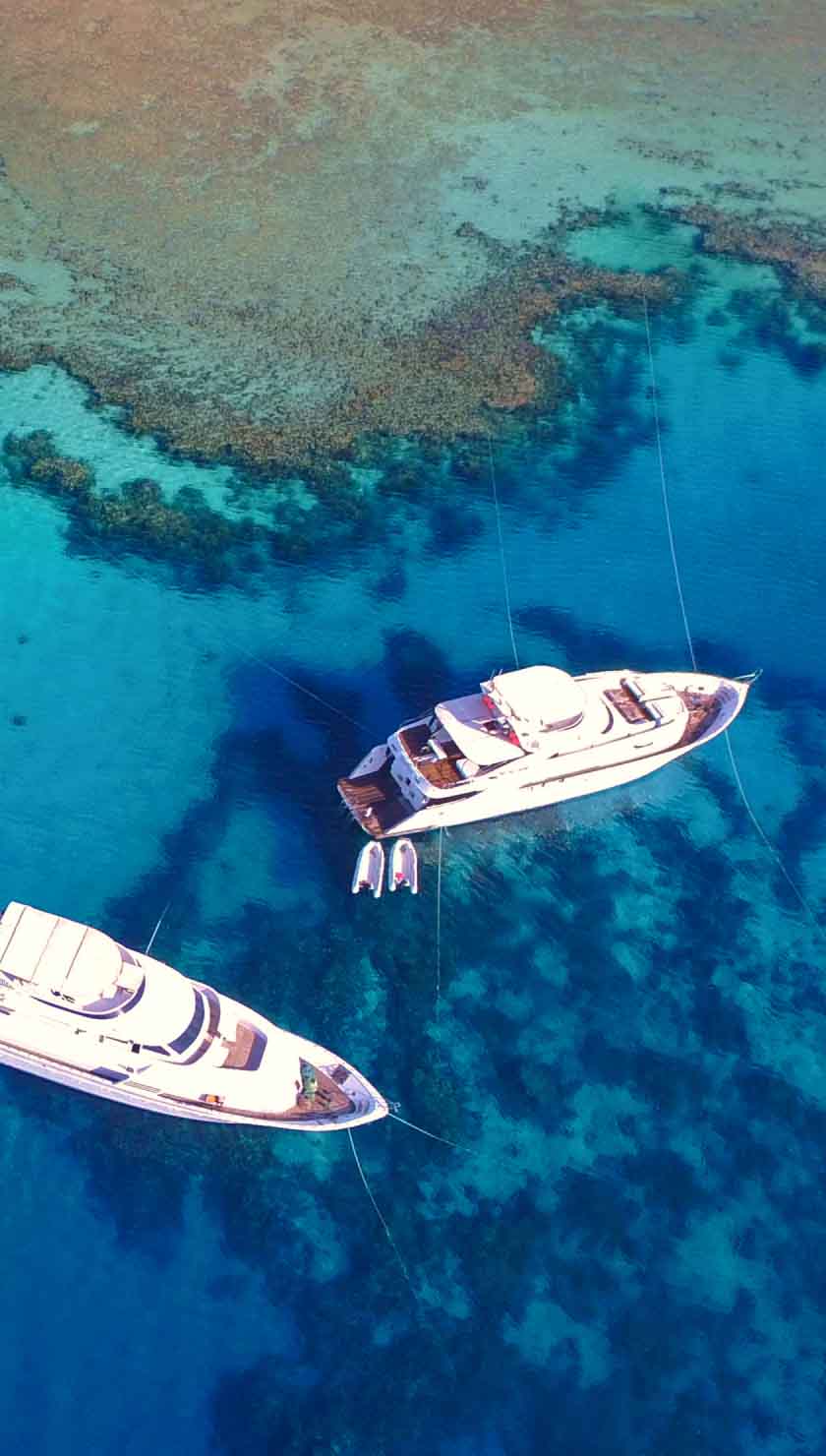Liveaboard Diving in Malapascua
What to expect on a Malapascua Liveaboard
Malapascua, a tiny island 6.8 km from the northern tip of Cebu, is hugely famous for thresher sharks; it's the only place in the world where these deep-water swimmers can be seen daily. As if that's not enough to recommend it, Malapascua offers many varied dive sites and a laid-back island life without hustle, bustle, or cars. Liveaboards in Malapascua are the best way to combine the island with other top dive sites in the Visayas, in locations like mainland Cebu, Leyte, Bohol, Negros, and more.
In the waters around its 3 square kilometers' landmass, Malapascua sports over twenty different dive sites that draw divers year after year. Of all its sites, Monad Shoal is Malapascua's center point and crown jewel. Monad Shoal is a submerged island perched on the lip of a steep drop-off that descends 200 meters down into the abyss. This location brings denizens of the deep, like threshers, manta rays, devil rays, and sometimes other sharks, up from their usual haunts to shallower cleaning stations, especially in the early morning. Shark Point and Shark Wall are the two main thresher dive sites requiring advanced divers- even better with nitrox.
Gato Island is perhaps the second best-known Malapascua dive site. In the waters around Gato, there are at least five unique dive sites with great diversity of creatures, small and large, including an impressive abundance of banded sea snakes. The dive site Whitetip Alley hosts sleeping whitetip sharks and macro-critters. The Guardhouse offers sought-after pygmy seahorses. The Cave, not for inexperienced or timid divers, consists of a 30-meter tunnel filled with swimming and resting sharks... be prepared for them to swim right in front of your face. Cathedral also hosts whitetips among its impressive rock formations, and Nudibranch City speaks for itself.
The underwater island of Kimud Shoal completes the holy trinity of top Malapascua dive sites; this is Malapascua's hammerhead shark destination. Kimud lies near Monad Shoal, and is similarly characterized by a steep slope into the deep of more than 200 meters. Hammerhead season is from December to May, but around April, you may be lucky to see an occasional individual or pair and a school of hammerheads in numbers up to 200. It's also possible to see threshers, mantas, and other rays. With great hard coral at the top, pretty soft coral along the sides, macro, and overhangs, Kimud can't be beaten. There are sometimes even dolphins nearby!
For dusk and night dives, Lighthouse offers a unique opportunity to encounter technicolor mandarin fish reliably; they can even be seen mating. Photogenic invertebrates like squid and cuttlefish, plenty of nudibranchs, colorful shrimp, octopus, and seahorses are common here. Lapus Lapus Island is Malapascua's premier site for coral health and quality. Lapus Lapus has some pristine coverage and high diversity of hard and soft corals and also hosts incredible macro enjoying the healthy reef.
Muck diving is possible in Bantigi, with a substrate similar to the famous Lembeh in Indonesia. On a 12-meter sandy bottom, cuttlefish, sea moths, mimic octopus, and stargazers can all be seen. In the wrecks category, Dona Marilyn offers benthic rays, whitetip sharks, and reef fish-like sweetlips that have grown to impressive sizes. The ocean life that has colonized this ship can be considered a memorial to the tragic loss of life from its sinking in a typhoon. Penetration is possible for qualified divers. Tapilon, on the other hand, is a Japanese wreck from World War Two, sunk by a torpedo. Black coral bushes compete for attention with nudibranchs, flatworms, cuttlefish, fire urchins, and sometimes ornate ghost pipefish and large marble rays.
Itinerary details
The length of liveaboard itineraries in Malapascua can be 6, 10, or 12 nights, with a budget from around 250 to 350 euros per night. On liveaboard.com, the S/Y Philippines Siren and the Seadoors liveaboards go to Malapascua. The Siren offers 10-night trips, and Seadoors usually offers 6-night itineraries, with an occasional 12-night trip.
S/Y Siren is a luxury sailing yacht from the world-traveling Siren fleet. Its 40-meter length accommodates up to 16 guests with high-quality comfort and aesthetic perks like gorgeous billowing sails. The Siren combines Malapascua with other dive areas in Cebu, Bohol, and Negros. Seadoors offers slightly different itineraries. For example, the Camotes and Southern Leyte are included on its 6-day trip. On the Seadoors' long trip, Camiguin and Siquijor are added to Negros and Southern Leyte. The long trip includes three land tours to see waterfalls, markets, and tarsiers. Seadoors is a custom-built dive boat with a length of 25 meters, accommodating up to 16 divers with great diving amenities and comfort.
The experience level required by Malapascua liveaboards is Open Water, with either ten or twenty dives, depending on the itinerary. Select dive sites in the Philippines experience current, but the country is not as infamous for fast-moving water as the Maldives or Indonesia.
Best time to travel
Malapascua can be dived all year round. While it does experience slightly wetter weather during the regional rainy season of July through December, its location away from the mainland and mountain ranges means that rain is infrequent compared to Cebu. Waves and wind can hit the island from various directions, but there is always somewhere sheltered to dive. Thresher sharks and whitetip sharks are present year-round these days. Hammerheads, however, peak in March or April at the end of their December through April season. Some say mantas usually peak around September. The water temperature in Malapascua can range from 24 to 30 C, with the lower temperatures corresponding to winter in the northern hemisphere.
Liveaboard departures
Cebu City and Malapascua are the departure locations for Malapascua liveaboards. Cebu City is a booming metropolis and the regional capital of the Visayas, with a port that sends ferries, cargo ships, and Philippines liveaboards out in every direction. Getting to Cebu City is easy with a 1.5-hour flight from Manila or direct flights from select Southeast Asian countries nearby. International flights can get to Cebu City via a transfer in Asia. Conversely, Malapascua has no airport, but it can be reached by taxi, van, or bus (and small boat). From Cebu City, getting to Malapascua requires a five-hour bus journey; taxis take about half that time.











